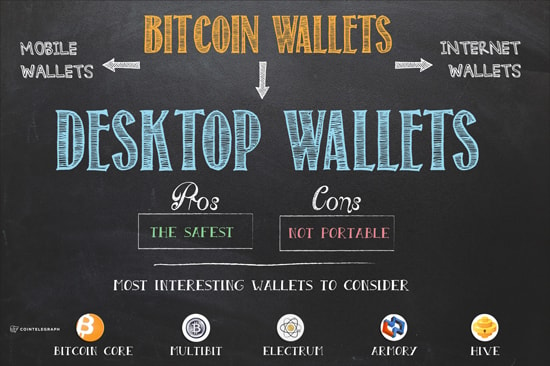Nothing has changed since the funds in our possession have travelled from physical wallets made of leather and textile or porcelain piggybanks to online wallets created from intangible matters. The keeping principle is still the same – the secret and even intimate carrier has to be reliable, safe and private. No holes, especially cryptographic, can be tolerated.
Types of Bitcoin Wallets
Let us make the first stop at the types of wallets presented to the Bitcoin users. One of the widely used classifications divides all of them in three main groups:
-
Desktop wallets.
-
Mobile wallets.
-
Internet wallets.
Each has to be observed attentively for the determination of main advantages and disadvantages, as both of them exist and help to make the correct choice. This particular article has been created to make a small, but rather useful research of desktop wallets.
The Pros and Cons of Desktop Wallets
First of all, this type of wallets is the safest among existing counterparts. It is installed on the desktop machine under Your full control, as well as the sums stored inside are under close examination. The backup, safety, availability of the machine to other users is up to You. Such conditions are very close to the possession of real, fiat money.
In case You make the purchases or all transactions from a single PC, the desktop wallet seems to be very comfortable. The main disadvantage appears, if You need a portable carrier. The radius of activity of the user is limited by the equipment, while mobile and Internet wallets provide a higher level of movement freedom.
Most Interesting Wallets to Consider
Bitcoin Core
While available for the most existing operating systems, as Windows, Mac OS X, Linux and Ubuntu, provides exceptional conditions of safety, anonymity and stability. The main disadvantages are only few supported options and requirements for much space on the disk. Do not plan to install it fast and at once, the downloading routine requires up to 1 day even by high connection speeds.
